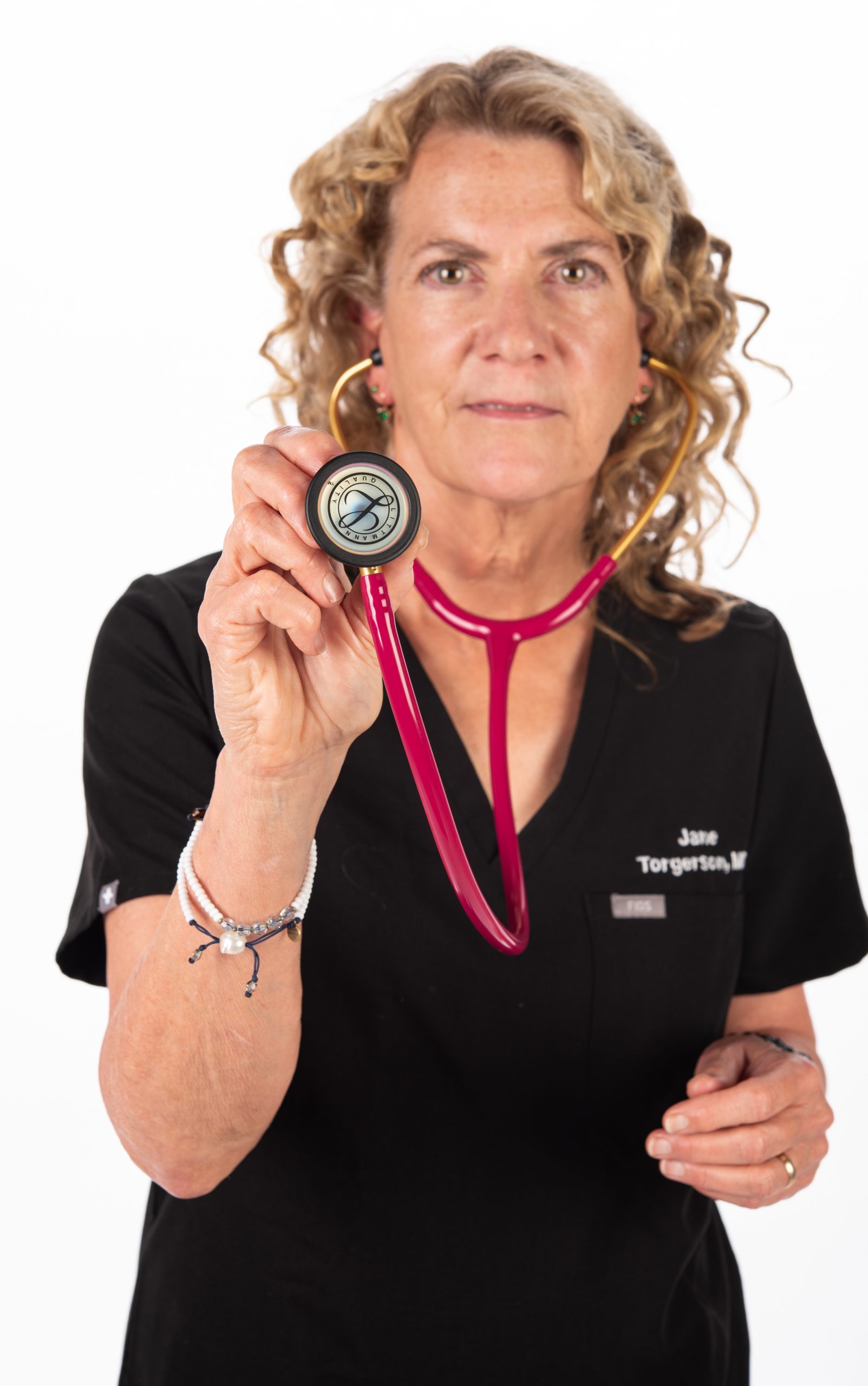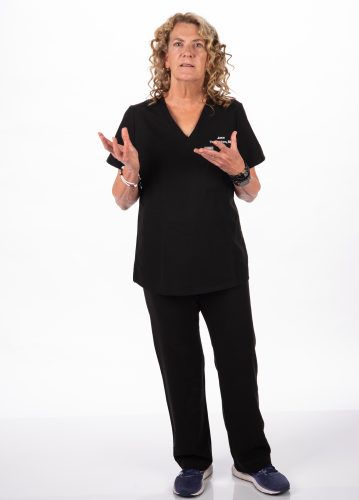Treating the student body: A Q&A With Jane Torgerson
How the Brown-Lupton Health Center medical director is steering TCU through the pandemic.

Medical director Jane Torgerson sees everything from sore throats to Covid at the Brown-Lupton Health Center. Photo by Glen E. Ellman
Treating the student body: A Q&A With Jane Torgerson
How the Brown-Lupton Health Center medical director is steering TCU through the pandemic.
A modest-size building across from the Dee J. Kelly Alumni & Visitors Center houses a substantial health care operation, one that sees 20,000 patient appointments each year.
Dr. Jane Torgerson has worked at the Brown-Lupton Health Center for 17 years and became its director in 2009.
She brings a quarter-century of work in emergency medicine to the role, as well as an abiding interest in integrated medicine; in 2017, she completed a fellowship at the prestigious Andrew Weil Center for Integrative Medicine at the University of Arizona.
She’s steering TCU through the pandemic, which has seen thousands of students fall ill. “I almost don’t remember the pain, but for one entire year it was hard,” she said. “I dreamt about Covid almost every night.”
What drew you to medicine?
I was the youngest of three girls who grew up outside of Chicago, and I liked lab stuff. I majored in biology and chemistry at Regis [in Colorado]. One day I went home and my dad said, “Why don’t you be a doctor?” I said OK.
How did you come to North Texas?
I went to medical school at the University of Utah and did my emergency medicine residency in Oklahoma, where I met a kindred soul. I went off to be a doctor in Yuma, Arizona, and when she started the emergency medicine group at Arlington Memorial Hospital, my husband and I came to work for her.
“I think that’s what we feel our mission is: to help these kids figure out health care and to take care of themselves.”
Jane Torgerson
And TCU?
I’d always said one day I wanted to work at a college, but at the time there was no turnover at TCU. If you worked here, you stayed. Back in 2005, one of the doctors retired.
What keeps you here?
I love it. The mission for the student health center is to promote, protect and maintain the students’ mental and physical health. Everyone who works here, to a person, has been here quite a while, and we just know college kids. Our collective mission is to grow them up.
What does that mean?
When they’re first-years, they come in and say, “I sneezed this morning.” By the time they’re seniors, they’re so mature. It’s just wonderful to see them grow up and learn how to take care of themselves. I think that’s what we feel our mission is: to help these kids figure out health care and to take care of themselves.
How do you create a welcoming atmosphere for the students?
The beauty of the way our health center works, there’s absolutely no charge to see a doctor, PA or nurse, so you can come back every day. Since it doesn’t cost anything to come in, we do a lot of close follow-up. Many of the 20,000 appointments each year are repeat.
What is the most common ailment you treat?
It kind of depends on the season, but upper respiratory is what we see the most.

Jane Torgerson makes it her mission to teach as well as treat her patients. Photo by Glen E. Ellman
Are you seeing more of anything recently?
Concussions, and I can’t quite understand it. We see so many concussions. A fair amount are related to alcohol, but still. It seems like a week will go by and I’ve seen five new concussions. That’s new.
Anything else that concerns you?
I see myself as an educator, and the lack of knowledge about sexually transmitted infections is a little bit shocking to me. The whole drinking thing worries me. So many drink to oblivion, and that’s when the unwanted sex happens. They drink too much and don’t remember anything.
Tell me about your staff of 20.
We have three physicians in addition to me. One is part time, one is quarter time and one is 75 percent, so they work into one-and-a-half positions. Then we have two physician assistants and 12 nurses. We have a full-time pharmacist, a dietitian and a couple of front office people.
How much time do you typically spend with a student?
The really wonderful thing about this job is the time I can spend with students, particularly when compared to an ER, where you need to get patients in and out. Here I easily spend at least 15 minutes. A student might come in with a sore throat, but then you find out they’re anxious or depressed. I have the luxury to spend a half-hour or 45 minutes with a student.
You participate in 13 parent orientations each year. What concerns do they have?
Many want to be able to sign a piece of paper that allows them to see everything medical relating to their student. My answer is that every time your student comes in I need their permission to talk to you. They might not care if you know about their sore throat, but they might care if you know about their chlamydia.
“The team we have here is naturally empathetic. It’s one of those jobs where I love to come to work, and they do too.”
Jane Torgerson
Walk us through the health center’s Covid-19 response.
The first thing we did was order all sorts of PPE, not knowing what was going to happen. … Then we thought we have to protect our staff. We have a lot of older staff, so we sent them home. They could triage from home. And then we thought we had to divide up the health center building, thinking about what would happen if a bunch of sick people came through the door. We now have two HVAC systems, so one part of the building is totally sealed off from the other. The university was kind enough to spend a lot of money on that. I’m proud to say that none of my staff got Covid from here. We protected everybody.
How many Covid patients have there been on campus?
Since the start of the pandemic, there have been 2,651 students that we know of with Covid. Approximately 800 students have been diagnosed/treated at the health center for Covid during that time.
After Covid was going full force, you got into the vaccine business.
I signed up pretty early with the state to be a vaccine provider. Luckily, we got allocations in December 2020. We gave them whenever and came in on weekends. Universitywide, from the data we have been able to collect, about 56 percent of student, faculty and staff are vaccinated.
The TCU and UNTHSC School of Medicine emphasizes empathy in patient care. Is that something that resonates with you?
The team we have here is naturally empathetic. It’s one of those jobs where I love to come to work, and they do too. I’m hopeful for this idea of the empathetic doctor because when I went through medical school at the University of Utah, it was probably the last thing they were looking for. It was all about grades and scores.
Editor’s Note: The questions and answers have been edited for length and clarity.

Your comments are welcome
Comments
Related reading:
Research + Discovery
A Role Model for Women in Medicine
OB-GYN chair April Bleich prepares future doctors for a lifelong journey with their patients.
Campus News: Alma Matters
Dr. Terence McCarthy Leads New Medical School’s Emergency Program
The doctor is the John M. Geesbreght MD, MS, FACEP Chair of Emergency Medicine — the first endowed chair position at the TCU and UNTHSC School of Medicine.
Alumni, Features
Barclay Berdan Leads the Covid Vaccination Effort in DFW
The Texas Health Resources CEO is a case study in crisis leadership.